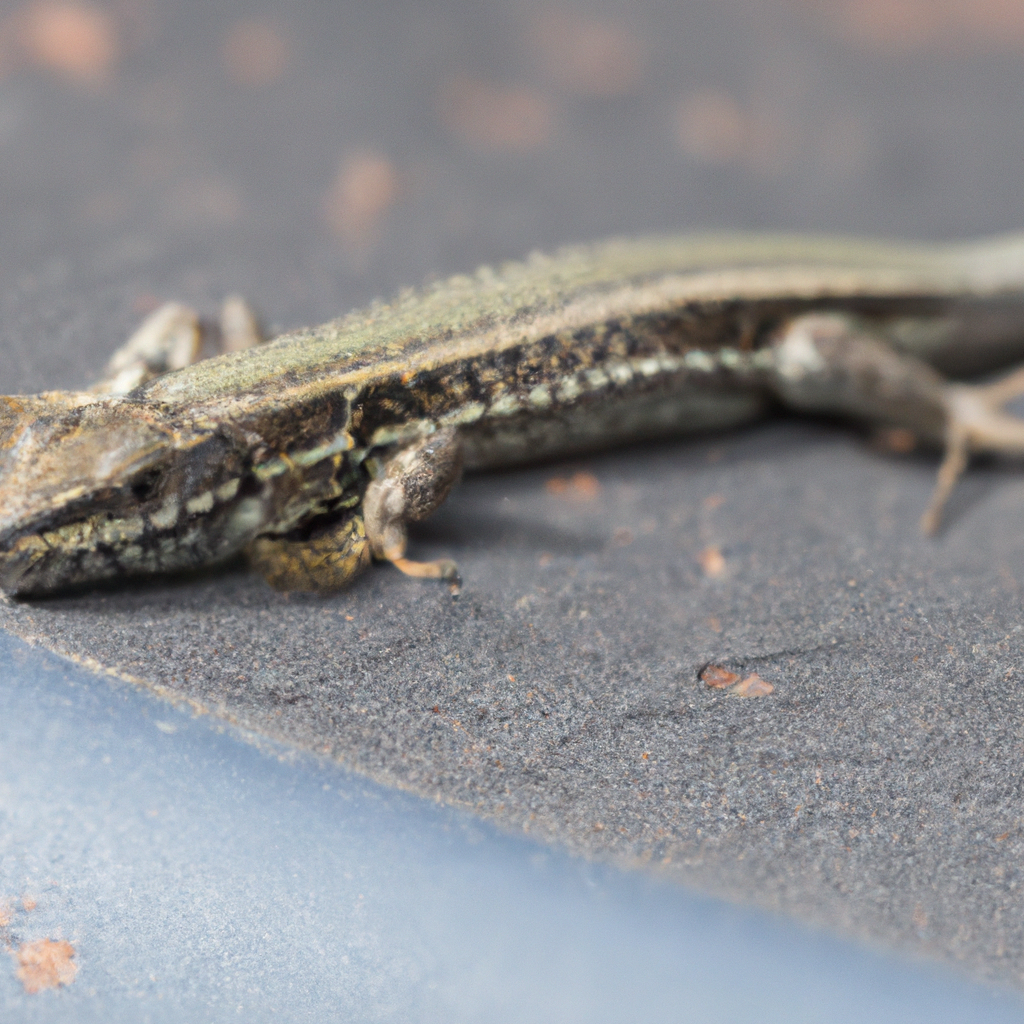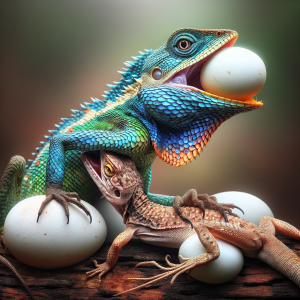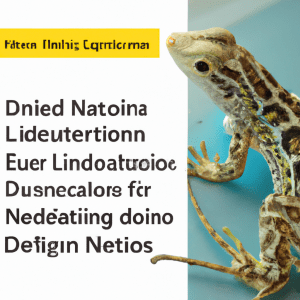Importance of Lizard Illness Prevention
Alright, picture this – you’re chilling with your pet lizard, soaking up those sunny vibes, when suddenly, you notice something seems off. Maybe they’re not as active as usual, or their appetite has taken a nosedive. Cue the lizard parent panic! But fear not, my friend, because today we’re diving into the fascinating world of lizard illness prevention.
Did you know that lizards are masters of disguise when it comes to hiding signs of illness? Yep, these little reptilian buddies have a knack for masking symptoms until things take a serious turn. That’s why staying proactive and keeping a close eye on your scaly companion is crucial for their well-being.
Imagine this scenario – you notice your lizard acting a bit sluggish, and you think, “Hmm, maybe they’re just having a lazy day.” But what if that subtle change in behavior is actually a red flag for an underlying health issue? By arming yourself with knowledge about common lizard illnesses and their symptoms, you’ll be better equipped to nip potential problems in the bud.
So, whether you’re a seasoned lizard owner or a newbie to the reptile realm, understanding the ins and outs of illness prevention is key to giving your pet the best shot at a long and healthy life. From proper nutrition and habitat maintenance to regular vet check-ups and stress management tips, we’ve got you covered on all fronts.
Stay tuned as we uncover the secrets to keeping your scaly sidekick in tip-top shape. Because when it comes to lizard health, a little prevention goes a long way. Let’s embark on this lizard wellness journey together, armed with knowledge, a keen eye, and maybe a few extra crickets for good measure.
Common Illnesses in Pet Lizards
You know, when it comes to common illnesses in pet lizards, it’s not just about knowing what symptoms to look out for or how to treat them. It goes much deeper than that. Understanding these illnesses and taking steps to prevent them can have a significant impact on the overall health and well-being of our scaly friends.
Think about it – lizards are unique creatures with specific environmental and dietary needs. When they fall ill, it can be quite challenging to treat them due to their sensitive nature. By familiarizing ourselves with the common illnesses that can affect lizards, we can be better prepared to provide them with the care they need to stay healthy.
Not only does preventing illnesses in pet lizards save us the stress and worry of dealing with a sick pet, but it also fosters a strong bond between us and our reptilian companions. When our lizards are healthy and thriving, they can live their best lives, basking under their heat lamps or exploring their terrariums with vigor.
Moreover, by prioritizing lizard illness prevention, we also contribute to the larger conversation about responsible pet ownership. Just like any other pet, lizards deserve to be cared for in a way that promotes their health and happiness. When we take the time to educate ourselves about their specific needs and potential health risks, we are demonstrating our commitment to being responsible and caring pet owners.
So, the next time you read about common illnesses in pet lizards, remember that it’s not just about keeping them free from disease – it’s about nurturing a relationship built on trust, care, and mutual well-being. The significance of lizard illness prevention extends far beyond just the health of our scaly companions; it speaks to our dedication to providing them with a fulfilling and enriching life by our side.
Signs and Symptoms to Watch Out For
Imagine you’re explaining III. to a friend (400 words). Engage in a lively conversation as if you were talking in person, keeping the tone informal yet informative (400 words).
Let’s dive into the signs and symptoms to watch out for in your pet lizard to ensure their well-being. Picture this: you’re admiring your scaly friend as they bask under their heat lamp. Suddenly, you notice something seems off. Maybe they’re not as active as usual, or their appetite has decreased. These subtle changes could be early indicators of a potential health issue.
When it comes to our lizard buddies, they can’t communicate with us through words, so it’s crucial to pay attention to non-verbal cues. Keep an eye out for signs like changes in appetite, unusual behaviors, skin abnormalities, or irregular bowel movements. These could be red flags that something is amiss with your scaly companion. Remember, prevention is key when it comes to maintaining their health.
Here’s an interesting fact for you: did you know that lizards are experts at hiding signs of illness? In the wild, showing weakness can make them vulnerable to predators, so they’ve evolved to mask symptoms until they’re seriously unwell. That’s why it’s essential for lizard owners to be vigilant and observant, picking up on even the subtlest hints that something might be wrong.
So, how can you stay on top of your lizard’s health? Regular health check-ups are crucial. Just like we visit the doctor for routine exams, your lizard should see a reptile veterinarian for periodic assessments. These professionals can detect early signs of illness that might go unnoticed by the untrained eye, helping to nip potential problems in the bud before they escalate.
By staying proactive and attuned to your lizard’s behavior and physical condition, you can be your scaly friend’s best advocate for a long and healthy life. Remember, a little observation and care go a long way in ensuring your pet lizard stays happy and thriving in their terrarium kingdom.
Best Practices for Preventing Lizard Illnesses
Let me share a practical tip related to preventing lizard illnesses that I recently learned about. So, you know how important it is to keep your pet lizard healthy, right? Well, one key aspect of preventing illnesses in lizards is maintaining a clean and suitable habitat for them.
I recently read that maintaining a clean habitat is crucial for preventing illnesses in pet lizards. Just like how we need a clean living environment to stay healthy, lizards also require a clean and safe space to thrive. Dust, dirt, and bacteria can easily accumulate in their habitat, leading to potential health issues if not addressed.
To ensure your lizard stays healthy, it’s essential to regularly clean their enclosure, including removing any uneaten food, feces, and shedding skin. Keeping the habitat clean not only helps prevent the spread of germs but also creates a comfortable and stress-free environment for your pet.
Another important aspect of habitat maintenance is ensuring proper temperature and humidity levels. Different species of lizards have specific temperature and humidity requirements, so it’s vital to research and provide the right conditions for your pet. Maintaining the ideal environmental conditions can help boost your lizard’s immune system and prevent illnesses caused by stress or environmental factors.
Moreover, regularly inspecting the habitat for any signs of mold, parasites, or other potential hazards is crucial for your pet’s well-being. By being proactive in maintaining a clean and suitable habitat, you can significantly reduce the risk of your lizard falling ill and promote their overall health and happiness.
Remember, a clean habitat is not just about aesthetics; it directly impacts your lizard’s health and longevity. So, make habitat maintenance a priority in your lizard care routine, and you’ll be taking a proactive step towards preventing illnesses and ensuring a thriving life for your scaly friend.
Proper Nutrition for Healthy Lizards
I want to share an interesting fact with you about proper nutrition for healthy lizards. Did you know that lizards have specific dietary needs based on their species? It’s fascinating how different types of lizards require different types of food to stay healthy and thrive.
Imagine you have a pet bearded dragon, for example. These lizards are omnivores, which means they need a balanced diet of insects and vegetables to meet their nutritional requirements. On the other hand, if you have a gecko as a pet, they are primarily insectivores and need a diet rich in live insects such as crickets and mealworms.
Ensuring your lizard gets the right nutrition is crucial for their overall health and well-being. Providing a varied diet that includes a mix of protein sources, fruits, and vegetables is essential to prevent nutritional deficiencies and related health issues.
When it comes to feeding your lizard, it’s important to research their specific dietary needs based on their species. Some lizards may require vitamin or mineral supplements to complement their diet, while others may have allergies or sensitivities to certain foods. By understanding and meeting your lizard’s nutritional requirements, you can help them live a long and healthy life.
Remember, just like us, lizards need a balanced diet to stay healthy. So, next time you’re preparing your pet lizard’s meal, think about their specific dietary needs and make sure to offer them a variety of foods to keep them happy and healthy. By paying attention to their nutrition, you’re taking a proactive step in preventing illnesses and promoting their overall well-being.
Maintaining a Clean and Healthy Habitat
So, when it comes to maintaining a clean and healthy habitat for your pet lizard, there are a few practical tips that can make a big difference. One key aspect is to regularly clean and disinfect the enclosure. This helps prevent the buildup of harmful bacteria and parasites that can pose a risk to your lizard’s health.
Another important tip is to pay attention to the substrate you use in the habitat. Choosing the right substrate is crucial as it can impact the cleanliness of the environment and your lizard’s overall well-being. Some substrates are better at absorbing moisture and odor, while others may harbor bacteria if not changed regularly.
It’s also essential to provide your lizard with a proper basking spot and hiding places within the enclosure. This allows them to regulate their body temperature and feel secure, reducing stress and potential health issues.
Maintaining proper humidity levels is another key factor in keeping your lizard healthy. Different species have specific humidity requirements, so it’s important to research and ensure that the humidity in the enclosure is within the optimal range for your pet.
Lastly, regularly inspecting the enclosure for any signs of mold, mildew, or pests is crucial. Addressing these issues promptly can prevent potential health problems for your lizard.
By following these practical tips and staying proactive in maintaining a clean and healthy habitat for your pet lizard, you can create a safe and comfortable living environment that promotes their well-being and longevity.
Importance of Hygiene and Cleanliness
Let me tell you about the importance of hygiene and cleanliness when it comes to preventing illnesses in pet lizards. It might not be the most glamorous topic, but trust me, it’s crucial for keeping your scaly friend healthy and happy.
Did you know that maintaining a clean environment for your pet lizard can significantly reduce the risk of illnesses? Just like us humans, lizards are susceptible to infections and diseases if they are exposed to a dirty or unsanitary habitat. So, it’s essential to ensure that their living space is kept clean and hygienic at all times.
Now, I get it – cleaning your lizard’s enclosure may not be the most enjoyable task, but think of it as a way to show your pet how much you care for their well-being. Regularly cleaning and disinfecting their tank or terrarium helps to remove harmful bacteria, parasites, and other pathogens that could make your lizard sick.
One practical tip I can give you is to establish a cleaning routine and stick to it. Make sure to remove any uneaten food, feces, shed skin, and other debris from the enclosure regularly. Use a mild detergent or pet-safe disinfectant to clean the surfaces, and always rinse thoroughly to remove any residue that could be harmful to your lizard.
Remember, cleanliness is not just about making the enclosure look nice – it’s about creating a safe and healthy environment for your pet. By maintaining good hygiene practices, you can help prevent illnesses and ensure that your lizard stays happy and thriving for years to come.
So, next time you’re tempted to skip cleaning day for your lizard, think about the impact it could have on their health. A little extra effort now can go a long way in preventing potential health issues down the road.
Regular Veterinary Check-ups for Lizard Health
Let’s delve into the importance of regular veterinary check-ups for our beloved pet lizards. Picture this – you schedule your annual check-up with the doctor to ensure you’re in tip-top shape, right? Well, our scaly friends deserve the same care and attention!
Regular veterinary check-ups play a crucial role in maintaining the health and well-being of our pet lizards. Why, you ask? Well, just like us, lizards can also fall ill or develop health issues that may not be immediately apparent. These check-ups serve as preventive measures to catch any potential problems early on.
Imagine this scenario: you notice your lizard behaving a bit differently – maybe eating less or being less active. It could be easy to dismiss these subtle changes, attributing them to mood swings or temporary factors. However, a veterinarian specializing in reptiles can conduct a thorough examination and detect any underlying health issues that might be causing these changes in behavior.
Not only do these check-ups help in identifying health concerns early, but they also provide an opportunity for you to discuss any questions or concerns you may have about your lizard’s care. Your vet can offer tailored advice on nutrition, habitat maintenance, and other aspects of lizard wellness that are specific to your pet’s needs.
Think of regular vet visits as a form of proactive care rather than reactive. It’s all about staying one step ahead to ensure your lizard leads a happy and healthy life. So, make that appointment and give your scaly companion the gift of preventive healthcare!
Remember, a little check-up can go a long way in keeping your lizard friend healthy and thriving. After all, prevention is always better than cure, especially when it comes to our precious reptilian pals!
Tips for Handling and Stress Management
Let me share a practical tip related to handling and stress management when it comes to caring for your pet lizard. Now, I know firsthand how important it is to understand the right way to handle these delicate creatures, especially when they’re feeling stressed out.
When it comes to handling your pet lizard, it’s crucial to approach them gently and with care. Remember, lizards are sensitive creatures, and sudden movements or rough handling can easily stress them out. I once made the mistake of trying to pick up my lizard too quickly, and let’s just say it didn’t end well – a little tail flick and a scurry later, I learned my lesson!
To ensure your lizard feels safe and secure during handling, it’s best to approach them calmly and confidently. Start by allowing your lizard to get used to your presence by placing your hand near them without making sudden movements. Slowly and gently scoop them up from below, supporting their body to avoid any discomfort.
Another key tip is to be mindful of how long you handle your lizard. Just like us, they need their personal space and downtime. Keep handling sessions short and sweet, gradually increasing the duration as your lizard becomes more comfortable with you. And always remember to wash your hands before and after handling to prevent any potential stress from unfamiliar scents.
By following these tips, you can help your pet lizard feel more secure and reduce their stress levels, ultimately contributing to their overall well-being. Building a trusting relationship with your lizard through proper handling techniques will not only benefit their health but also strengthen the bond between you and your scaly friend. So, take it slow, be gentle, and watch as your pet lizard thrives in a stress-free environment.
Ensuring a Healthy and Happy Life for Your Pet Lizard
Let me tell you about the importance of regular veterinary check-ups for your pet lizard. It may not be the most exciting topic, but trust me, it’s crucial for your lizard’s well-being. Think of it as a routine health check, just like how we humans go for our annual physicals.
You see, a while back, I had a pet lizard named Spike. He seemed perfectly fine, basking under his heat lamp and munching on his favorite crickets. But one day, he started acting a bit off – sluggish and not as active as usual. I was worried and decided to take him to the vet. Turns out, Spike had a minor infection that could have escalated if left untreated. That incident made me realize the importance of those regular check-ups.
Did you know that reptiles are masters of disguise when it comes to hiding illnesses? They can often mask symptoms until things get serious. That’s why it’s crucial to have a reptile-savvy vet examine your lizard regularly. They can detect subtle signs of illness that might go unnoticed by us lizard owners.
Now, I get it, taking your lizard to the vet may not be the most fun outing, but it’s a small price to pay for your pet’s health. The vet can check for any underlying health issues, provide preventive care, and offer valuable advice on how to keep your lizard in top shape.
Imagine if you skipped those regular check-ups and missed a potential health issue brewing in your lizard. It could lead to more significant problems down the line, impacting your pet’s quality of life. So, scheduling those vet appointments is not just a chore; it’s a proactive step in ensuring your lizard’s health and happiness.
Remember, our scaly friends rely on us to look out for their well-being. So, next time you’re due for a vet visit, don’t procrastinate – your pet lizard will thank you for it!




